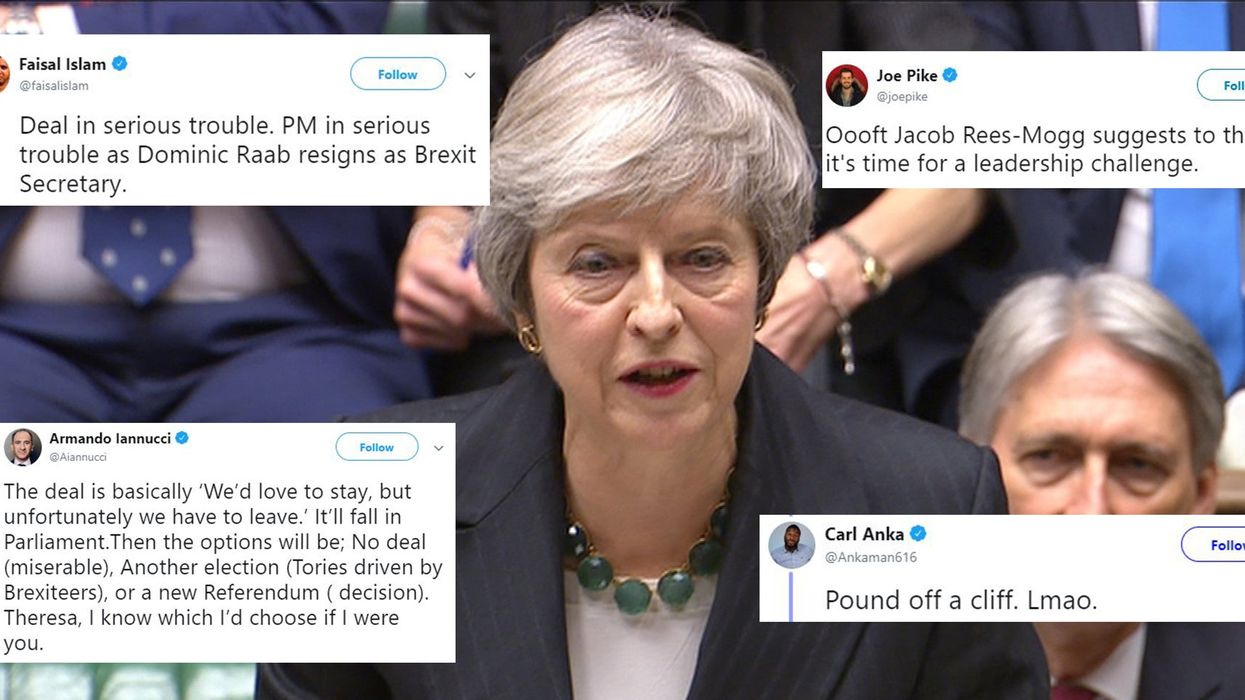News
Greg Evans
Nov 15, 2018
Thursday, November 15, 2018, is proving to be a momentous day in British political history.
On Wednesday, prime minister Theresa May held lengthy talks with her cabinet and that evening declared that she had the backing of her ministers.
However, by Thursday morning, it was evident that Mrs May did not have the backing of her cabinet, as members began resining in quick succession.
The first to resign was Northern Ireland minister Shailesh Vara, who announced his resignation on Twitter at 7:32 am.
Mr Vara was only appointed in the role this year and was asked to oversee the concerns surrounding the possibility of a hard border being reintroduced between the Republic and Northern Ireland.
In the statement, Vara directly criticised May's agreement and claimed that the UK was 'shackled' to the European Union:
With respect Prime Minister, this Agreement does not provide for the United Kingdom being a sovereign, independent country leaving the shackles of the EU, however it is worded.
Unfortunately for him, his resignation was greeted with little reaction or fanfare, but it proved to be a catalyst for what was to come.
Dominic Raab, the Brexit secretary who was only appointed in July following the departure of David Davis, announced his resignation at 9am on the basis that he couldn't "in good conscience support the terms proposed for our deal with the EU".
This proved to be arguably the biggest moment of the morning, as Raab was the person asked to draft up the deal with the EU which eventually proved to be so divisive.
In his letter, Raab feared that the deal would divide the UK and pose a threat to the country's integrity.
I cannot support the proposed deal for two reasons.
First, I believe that the regulatory regime proposed for Northern Ireland presents a very real threat to the integrity of the United Kingdom.
There were many jokes about the irony of Raab's resignation, but the seriousness of his resignation for the country and the prime minister was obvious.
Raab's exit saw the pound dramatically plummet in value, declining by more than 1 per cent against the US dollar and the euro.
Nearly an hour after Raab announced his departure, work and pensions secretary Esther McVey also said that she would be resigning.
The MP for Tatton said that the draft "does not honour the result of the referendum", and also cited that it would threaten "integrity of the United Kingdom". She added:
I cannot defend this and I cannot vote for this deal. I could not look my constituents in the eye were I to do that.
As one of the more unpopular Tory MP's, McVey's resignation wasn't greeted with a huge amount of sympathy or respect.
The next to resign was the junior Brexit minister Suella Braverman, who was a part of the Department for Exiting the European Union.
She admitted that she never expected to resign, thanked the PM for the opportunity and added that she looked forward to delivering Brexit from the backbenches.
The MP for Fareham's status saw her resignation greeted with a surprising amount of contempt.
At the time of writing the fifth and final MP to resign is Anne-Marie Trevelyan, who was the PPS to the education minister to the prime minister.
In her letter he wrote:
Some would say well just agree the treaty as it is now then bin it later. But I don't believe in that way of doing business - if we sign a treaty I want us to stand by it.
I believe we must protect the Brexit mandate by trying to secure a deal which understands the spirit of the referendum, or we mush have the leadership courage to deliver a WTO deal and work on a trade agreement later.
Once again, her minor status as an MP was greeted with questions as to who she was.
This dramatic morning left Theresa May in a very precarious position, having lost 17 members of her cabinet since Brexit negotiations began.
During PMQ's, May faced heavy scrutiny from her fellow MP's, with the prominent Tory Brexiteer, Jacob Rees-Mogg appearing to call for her resignation and a vote of no-confidence.
Whether that will happen remains to be seen, but at the moment there is a large part of Twitter who are calling for another general election or referendum.
We'll just leave this here.
More: An American wrote this Twitter thread on Brexit and it's eye-opening

Top 100
The Conversation (0)














